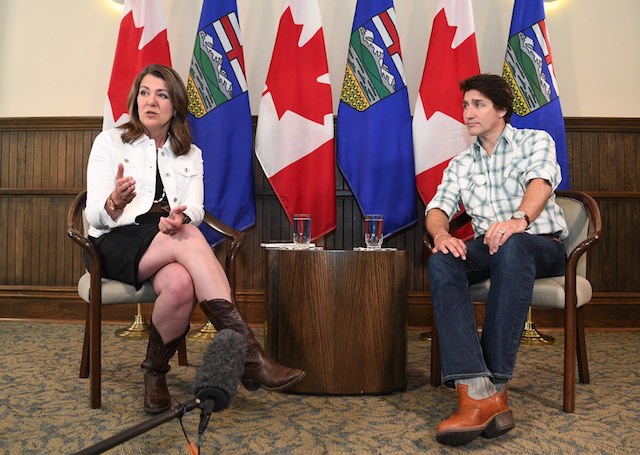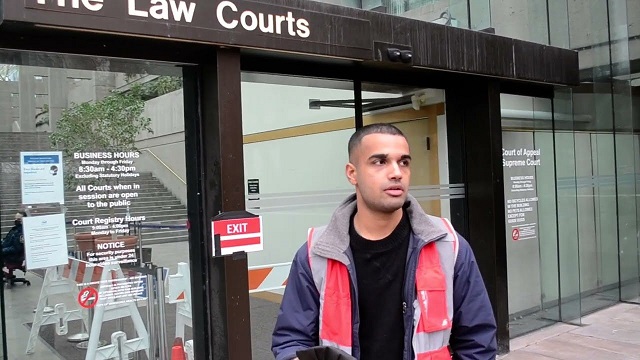Alberta
Premier Smith meets with Prime Minister Trudeau

Premier Danielle Smith met with Prime Minister Justin Trudeau on July 7 to discuss economic priorities.
Although the meeting was constructive, there are still several concerning issues that need to be resolved if Alberta and the federal government are to reach an agreement on an emissions-reduction plan that will simultaneously secure a reliable and affordable electricity grid, protect Alberta workers and drive economic growth in our energy sector for decades.
The positive news is the federal government has agreed to immediately form a bilateral working group with the Alberta government to work on an aligned framework to incentivize investment in carbon capture, utilization and storage as well as other emissions-reducing technologies.
This group would also work to develop a regulatory framework for the construction and use of small modular reactor technology in our province and to secure credit for carbon reduction through increased LNG exports to international markets. Article 6 in the Paris Accord allows for jurisdictions to receive credit for reducing emissions in other countries.
These are welcome developments.
However, the federal government has yet to formally recognize Alberta’s exclusive jurisdiction to set its own emissions-reduction targets and milestones on the path to a carbon-neutral energy sector and electricity grid by 2050.
They continue to set targets for a 42 per cent reduction in energy sector emissions by 2030 and a net-zero electricity grid by 2035. Both of these targets are unachievable, will drive billions of investment out of Alberta, massively increase electricity costs and result in the loss of tens of thousands of Alberta jobs.
We also understand the federal government is set to release its draft so-called ‘clean electricity’ regulations (CER) for feedback in the coming weeks, and which do not initially include a carve-out for provinces like Alberta, which needs more time to transition to a carbon-neutral power grid due to our reliance on natural gas-fired electricity generation.
It will be critical after this initial feedback period is complete that Ottawa grant Alberta’s requested CER carve-out until the working group has reached an agreement on decarbonizing our power grid that Albertans can afford and support.
Albertans have borne the significant cost of replacing all coal-fired electricity generation with natural gas seven years ahead of schedule, for which ratepayers have already paid billions in compensation and will continue to make these compensation payments through 2030.
Alberta has sovereign and exclusive constitutional jurisdiction to regulate our energy and electricity industries. This is non-negotiable.
We have asked the federal government to come to the table in good faith and to assess the realities of our power grid and the true magnitude of being the fifth-largest producer of oil and gas in the world.
If Ottawa does not recognize and support Alberta’s exclusive right to regulate these sectors of our economy, our province will have no choice but to use alternative policy options to protect our rights independent of federal interference.
Our sincere hope is that the newly formed federal and provincial working group will be able to facilitate an agreement that will align Ottawa’s efforts with the Alberta government’s Emissions Reduction and Energy Development Plan.
Failing to reach an agreement on these matters would be an unprecedented missed opportunity that would cost our country tens of billions in economic investment and countless jobs from coast to coast. We look forward to starting the working group as soon as possible.
Alberta
Former senior financial advisor charged with embezzling millions from Red Deer area residents

News release from Alberta RCMP
Former senior financial advisor charged for misappropriating nearly $5 million from clients
On April 4, 2024, the RCMP’s Provincial Financial Crime Team charged a Calgary resident for fraud-related offences after embezzling millions of dollars from his clients while serving as a senior financial advisor.
Following a thorough investigation, the accused is alleged to have fraudulently withdrawn funds from client accounts and deposited them into bank accounts he personally controlled. A total of sixteen victims were identified in the Red Deer area and suffered a combined loss of nearly $5 million.
Marc St. Pierre, 52, a resident of Calgary, was arrested and charged with:
- Fraud over $5,000 contrary to section 380(1)(a) of the Criminal Code; and,
- Theft over $5,000 contrary to section 344(a) of the Criminal Code.
St. Pierre is scheduled to appear in Red Deer Provincial Court on May 14, 2024.
“The ability for financial advisors to leverage their position to conduct frauds and investment scams represents a significant risk to the integrity of Alberta’s financial institutions. The investigation serves as an important reminder for all banking clients to regularly check their accounts for any suspicious activity and to report it to their bank’s fraud prevention team.”
- Sgt. John Lamming, Provincial Financial Crime Team
The Provincial Financial Crime Team is a specialized unit that conducts investigations relating to multi-jurisdictional serious fraud, investments scams and corruption.
Alberta
Political parties will be part of municipal elections in Edmonton and Calgary pilot projects

Strengthening Alberta’s local elections
Alberta’s government is introducing legislation to ensure Albertans can rely on transparent, free and fair elections, and municipally-elected officials have clearer accountability measures.
In a democratic society, Albertans expect their local elections to be free and fair, and their elected officials to be held to account by clear rules that govern their local councils. The Municipal Affairs Statutes Amendment Act proposes amendments to the Local Authorities Election Act (LAEA) and the Municipal Government Act (MGA) to add greater transparency to local election processes and ensure local councils and elected officials continue to remain accountable to the citizens who elected them.
“Our government is committed to strengthening Albertans’ trust in their local governments and the democratic process that elects local leaders. The changes we are making increase transparency for Alberta voters and provide surety their votes will be counted accurately. We know how important local democracy is to Albertans, and we will work with local authorities to protect and enhance the integrity of local elections.”
Local Authorities Election Act
Albertans expect free and fair elections and that’s why it’s important we strengthen the rules that govern local elections. To strengthen public trust in local elections, Alberta’s government will eliminate the use of electronic tabulators and other automated voting machines. All Albertans should be able to trust the methods and results of local elections; requiring all ballots to be counted by hand, clarifying rules and streamlining processes for scrutineers will provide voters greater assurance in the integrity of the results.
All eligible Albertans should be able to vote in local elections without impediment. Alberta’s government will limit the barriers for eligible voters to cast a ballot by expanding the use of special ballots. Currently, special ballots can only be requested for very specific reasons, including physical disability, absence from the municipality, or for municipal election workers. By expanding the use of special ballots, the government is encouraging more voter participation.
Amendments in the Municipal Affairs Statutes Amendment Act would increase transparency in local elections by enabling political parties at the local level. Political parties would be enabled in a pilot project for Edmonton and Calgary. The act will not require candidates to join a political party in order to run for a local or municipal office, but will create the opportunity to do so.
In addition, proposed changes to the Local Authorities Election Act would allow municipalities the option to require criminal record checks for local candidates, thus increasing transparency and trust in candidates who may go on to become elected officials.
Municipal Government Act
The role of an elected official is one with tremendous responsibility and expectations. Changes proposed to the Municipal Government Act (MGA) will strengthen the accountability of locally elected officials and councils. These include requiring mandatory orientation training for councillors, allowing elected officials to recuse themselves for real or perceived conflicts of interest without third-party review and requiring a councillor’s seat to become vacant upon disqualification.
If passed, the Municipal Affairs Statutes Amendment Act will also unlock new tools to build affordable and attainable housing across Alberta. Proposed amendments under the MGA would also create more options for municipalities to accelerate housing developments in their communities. Options include:
- Exempting non-profit, subsidized affordable housing from both municipal and education property taxes;
- Requiring municipalities to offer digital participation for public hearings about planning and development, and restricting municipalities from holding extra public hearings that are not already required by legislation; and
- Enabling municipalities to offer multi-year residential property tax exemptions.
Municipal Affairs will engage municipalities and other partners over the coming months to hear perspectives and gather feedback to help develop regulations.
Quick facts
- The LAEA establishes the framework for the conduct of elections in Alberta municipalities, school divisions, irrigation districts and Metis Settlements.
- The MGA establishes the rules governing the conduct of local elected officials once on council, as well as the overall administration and operation of municipal authorities in Alberta, including any policy those authorities may wish to implement.
Related information
-

 COVID-1916 hours ago
COVID-1916 hours agoPfizer reportedly withheld presence of cancer-linked DNA in COVID jabs from FDA, Health Canada
-

 Censorship Industrial Complex1 day ago
Censorship Industrial Complex1 day agoJordan Peterson, Canadian lawyer warn of ‘totalitarian’ impact of Trudeau’s ‘Online Harms’ bill
-

 Alberta2 days ago
Alberta2 days agoAlberta rejects unconstitutional cap on plastic production
-

 Alberta2 days ago
Alberta2 days agoAlberta official reveals ‘almost all’ wildfires in province this year have been started by humans
-

 Bruce Dowbiggin1 day ago
Bruce Dowbiggin1 day agoCome For The Graduate Studies, Stay For The Revolution
-

 Business2 days ago
Business2 days agoTaxpayers criticize Trudeau and Ford for Honda deal
-

 Business2 days ago
Business2 days agoDon’t be fooled by high-speed rail
-

 Censorship Industrial Complex2 days ago
Censorship Industrial Complex2 days agoAustralian politicians attack Elon Musk for refusing to remove video of Orthodox bishop’s stabbing







